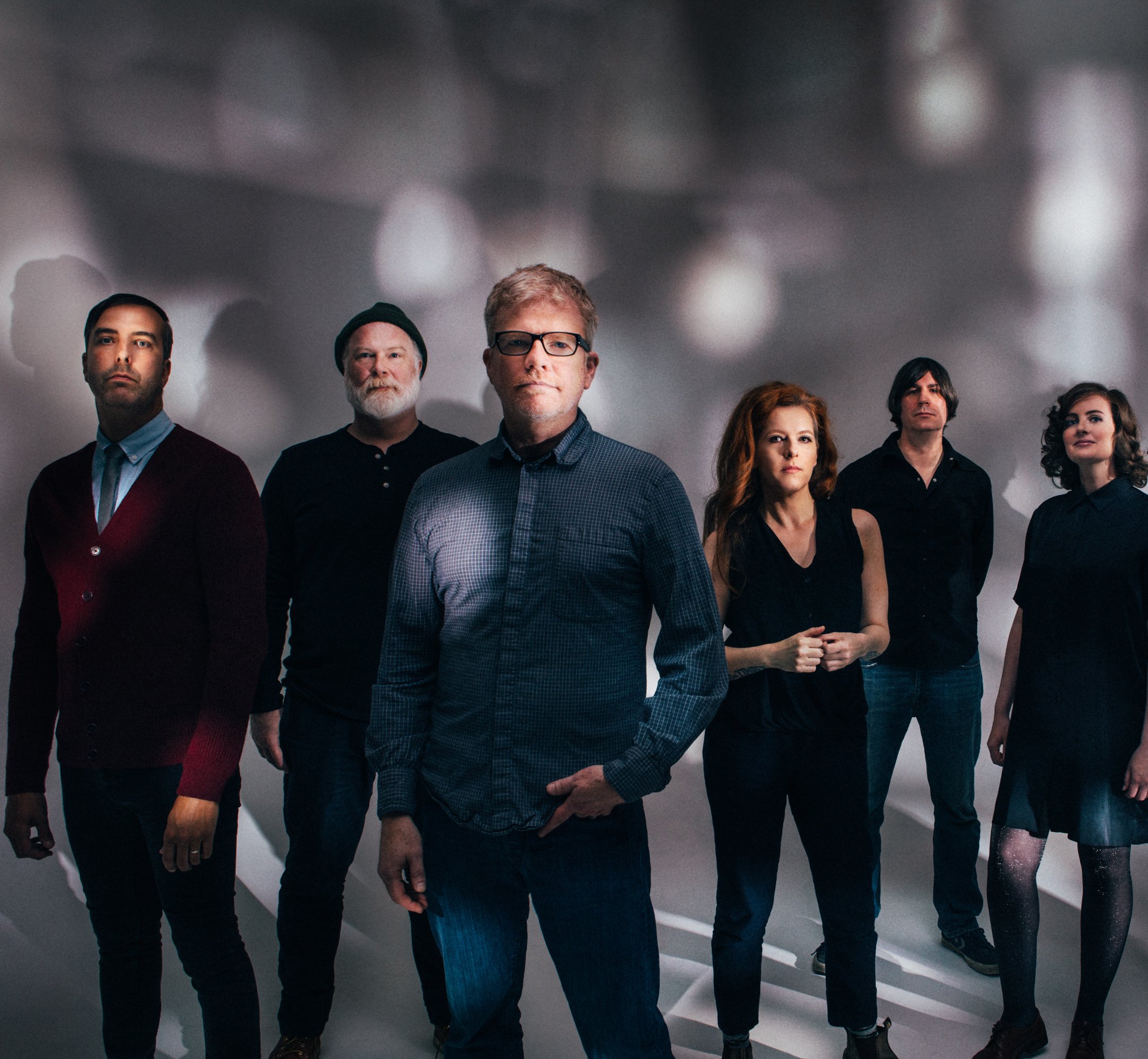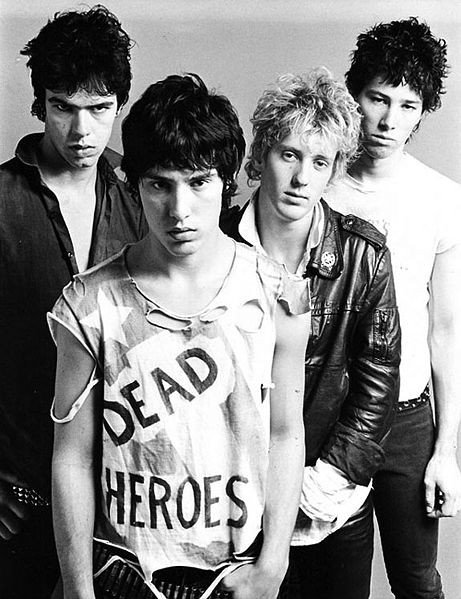New Pornographers' Experiment by Not Being Experimental on New Album

The New Pornographers, by Ebru Yildiz. A.C. Newman, center.
A.C. Newman’s songs on “Continue as a Guest” strike out in a new direction for him by being more direct.
“I’m trying to do things that people have been doing forever, but it’s me trying to break out of my habits by doing something more straightforward or narrative-driven.”
A.C. Newman is talking about the songs he wrote for Continue as a Guest, the ninth album by The New Pornographers. Since 2001’s Mass Romantic, he has shown a gift for intricately constructed pop songs that take unexpected but exciting musical turns. As a lyricist, he’s known for songs that have an inner logic and degree of wordplay that allow the room for isteners to construct their own meanings while remaining a little opaque.
It’s not initially obvious that his songwriting heroes are Burt Bacharach, Brian Wilson, and Jimmy Webb, but it makes sense. Their compositions have become iconic for their exacting craft. Bacharach’s “Promises Promises,” for example, demands remarkable breath control, range, and verbal dexterity from its singers, but the precision in those compositions resulted in songs with memorable melodies and strong, clear emotional moods.
For much of his musical career, Newman treated his compositions with similar reverence, but while working on Continue as a Guest, something changed. Recording it during and after the COVID gave him the opportunity to reconsider the sanctity of his songs, and the results freshen the new album, the band’s ninth.
The New Pornographers play Tipitina’s on Friday night.
The band made its recorded debut with Mass Romantic, echoing ‘90s Britpop specifically with the history of pop creeping around the edges. The songs overflowed with ideas, so much so that it’s easy to imagine less ambitious bands unpacking one great New Pornographers song to make three very good ones. Everybody in the band had or came from other popular indie projects including singers Dan Bejar and Neko Case. In the years since, lineups have changed—Bejar is not on Continue as a Guest—and a project that began on the tailwinds of Blur and Oasis soon took on its own identity.
Continue as a Guest filters uncertainly through the lyrics, but the band’s affection for pop as a music and experience means that the associated emotions flicker by so quickly that you’re not sure if you really heard them. The isolation associated with COVID was integral to the album’s creation, so those emotions make sense, but they only linger like an aftertaste and don’t define the album. It’s an impressive, energetic collection that shows what the band can still do nine albums into a career.
Although others have contributed songs to their albums, Newman’s have been the band’s default voice. He thought of himself as a songwriter first, and because of that, he has always had very specific ideas about what he was doing. “I’m composing a melody,” he thought, with the emphasis on composing. Sometimes though, he got in studio and discovered that what he had written didn’t work. Sometimes he had trouble fitting the melody to the words he had written. “Sometimes I sang a harmony and realized the harmony line was better than the melody.” Sometimes what he had written tested his actual musical abilities, but when that happened, he took it as a challenge and practiced until he could sing it properly.
He points to the title track from their Whiteout Conditions from 2017 as an example. “It has a lot of rapid-fire vocals,” Newman says, then quickly adds, “Well actually, almost every song.” There’s a slightly self-deprecating note in that addition, but it’s also probably true. One of the hallmarks of Newman’s songwriting has been the way his songs surprise with unexpected melodic twists or parts that come out of left field the first time they happen that seem inevitable by the third. In the energetic musical landscape of indie rock, his parts sound demanding.
“Now I’ve realized that when that’s happening, just change things,” he says by phone. While recording Continue as a Guest, Newman treated the written song as the starting place but if he found a smoother, more natural way to sing it, he went there. He acknowledges that that’s probably the way most people make songs, but it was new to him. “To me it was experimental, even though it was the simplest thing in the world.”
He recognizes that it’s a little weird that he never tailored his writing to his voice or singing abilities considering he’s one of the principal singers. “It’s kind of crazy,” Newman says. “When I started songwriting, I was shooting for something that was beyond my ability.” Looking back, he admires his younger self’s ambition to write in the mode of some of the great modern songwriters, then execute those ideas with his indie chops.
“That was the music that I loved, and I wanted to reach for that,” Newman says. “I wasn’t into the idea of myself as a rock star or a singer/songwriter. I was into the idea of writing. I wanted to make songs like that, and I didn’t have a Dionne Warwick around.”
Newman thinks Neko Case served as his Warwick, the muse who gave voice to many of Burt Bacharach and Hal David’s greatest songs. Newman met Case when she had just starting singing and realized that he wanted her voice on his songs. “Looking back, that was one of the smarter moves I’ve done in my life.” Even with Case, he put the composition first, but he made some concessions for her. When it came time to record “All for Swinging You Around” from 2003’s Electric Version, Newman played it for her in different keys to find the one that best suited her.
Newman now feels like he knows what Case can do. “Letter from an Occupant” was the first song that he had her sing,” and I knew that it was super-high,” he recalls. “It was right at the top of her register.” She’d probably say it was beyond her, he thinks, but that song became the musical yardstick he used to help him decide what vocal range would work for her.
The band has now been together since 1997 and you’d think over time he would naturally tilt songs toward the strengths of the singers, including John Collins and Katherine Calder, but Newman says no. “I don’t think I know how to write for somebody,” he says. His writing process takes so long that he doesn’t think of a song as truly finished until it is recorded and mixed. He sometimes realizes a song would be good for Case after recording the instrumental tracks.
“I admire that skill,” he says of writing for others. “I love that John Lennon wrote ‘Please Please Me’ as a Roy Orbison song. If you listen to it that way, it sounds exactly like a Roy Orbison song.”
Because the writing process is so long and amorphous, Newman says that he can only tell the story behind one song. Others have taken years from the initial germ to completion. Some songs on Continue as a Guest started while working on Whiteout Conditions., and “Really, Really Light” began in 2014 as a fragment of an idea by Bejar for Brill Bruisers that never came together. Newman gets ideas, works on them, files them when they hit a roadblock, and repeats that process until the song finds its final form.
“There’s something great about writing a song quickly, but sometimes I think if I finished these songs earlier and just pushed them out, they wouldn’t have been nearly as good,” he says. “It takes me a long time to find the feel I want or what I want the lyrics to be. It means I have to always work. I never know when the idea will come that will unlock a song.”
Newman admits the pandemic was part of the subtext for Continue as a Guest, which he worked on in his studio in Woodstock, New York. He is used to New Pornographers album sessions being semi-solitary affairs since the other band members often cut their parts in remote studios and send them in. But like most of us, the pandemic wore on him. He grew tired of chasing his own ideas around and wondered, Who cares about your thoughts, Carl? Look what’s going on in the world. Writing “Marie and the Undersea” for the album helped break him out of that mode by being his version of musical reportage. He started reading about emergency room nurses and wrote the song with them in mind. With lines like
You wake up, your nose still raw, and still out of place
And all the lines left from your mask tattooed on your face
You’ve come to know there’s only sleep and there’s never rest
There is no room for imagination, someone once said
that may not be immediately obvious. But “that was the first thing I wrote in a while that didn’t feel like bullshit,” Newman says.
“Marie and the Undersea” didn’t give Newman a method or a template for the album, but the process gave him the breakthrough that made it easier to get back in the rhythm of writing songs he liked. It also helped that he brought in his friend in Woodstock, Zach Djanikian. Newman was used to working on New Pornographers albums more or less on his own, but he liked having someone else with him for the mix in addition to mixing engineer Pete Hanlon. Djanikian gave him another set of ears as well as a musician able to play a number of instruments including the saxophone, which he adds to a number of songs in ways that evoke the ’80s.
“It was getting a bit too solitary,” Newman says, speaking for himself and almost everybody during 2020 and 2021.
That collaborative process led him to another kind that he had never experienced before. He liked the band Speedy Ortiz and reached out to its singer and songwriter Sadie Dupuis even though the two had never met. He had a set of lyrics that had become long and unwieldy, and since he had lost his way with them, he asked Dupuis if she could take a pass. She did, and her lyrics gave “Firework in the Falling Snow” its title. More than that, they helped him see themes and ideas that made it clearer where to go with the song. The song’s lyrics are not hers though, or not as she wrote them. Newman sent her a thank you note and told her how much he liked her lyrics before warning her, “I’m going to cut everything up into pieces and it’s not going to resemble what you wrote in the end.”
The album ends with “Wish Automatic Suite,” and its final movement folds in a dark chord or two to add an ominous undertone to the lyrics, “Meet me in the mirror maze / tell me when you find your way / Meet me in the mirror maze / tell me when you find the floor.” Newman’s focus in those lines was less on the disorientation they express and more on the guarded hope of the exit, and the image came from going to the Pacific National Exhibition in Vancouver each summer as a kid. “It’s like a child’s idea of being an adult,” he recalls, remembering the excitement of a big, weeks’ long fair with concerts, energy, excitement and magic that was also a bit shabby. The PNE had a mirror maze, and Newman remembers when it occurred to him, “Oh, it’s easy to find your way out of the mirror maze if you just look at the floor.”
After finishing the album, he saw Jordan Peele’s movie Us, which features a key scene in a mirror maze and worried for a moment that people would think he nicked that imagery from Peele. Newman ultimately decided he was on safe ground, figuring that he and Peele and everybody who has used a carnival as a setting did so for a similar reason. “There’s a weird combination of fun and trash and darkness,” Newman says. “The light and the dark—it’s all there.”
While Newman wants me to know that the end of “Wish Automatic Suite” didn’t come from an ominous place, he doesn’t work hard to tell me I’m wrong. His lyrics have always left room for many interpretations. They’re not quite Choose-Your-Own-Adventure, but they have left listeners a lot of leeway. He’s already working on the band’s next album and has taken tentative steps in a more definitive direction. He’s trying to be a little more plainspoken and make the songs more direct.
He worked in his version of this mode on “Last and Beautiful” on the new album. You might not hear it, but underneath the lines is a clear, linear thought progression: “I was going to do this, I was going to do this, I was going to do this, but I don’t want to go alone, come with me,” he explains. The song may be conventional by his standards, but fans will only hear it that way in contrast with other New Pornographers songs.
“I never wanted to make representational art very much,” he says. In a museum, he’s far more interested in Joseph Cornell’s boxes or works by Paul Klee or Picasso or Duchamps than portraits or landscapes. “They don’t have to make sense,” he says of his lyrics, but that leads to a question. If they don’t, how do you when they’re right? That’s a challenge Newman wrestles with, and it’s why he has to be on the clock for his creativity 24/7. He never knows when he’ll make a connection that helps him find the exactly right a bit of language or an image that helps him crack a song.
What makes a good song? “They just need to feel cool,” Newman says. “They just need to sound cool. Now when I find myself trying to move away from that, it feels experimental, but it’s not. It’s not experimental at all.”
Creator of My Spilt Milk and its spin-off Christmas music website and podcast, TwelveSongsOfChristmas.com.






